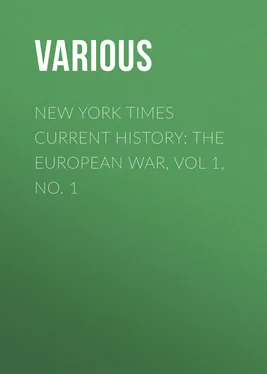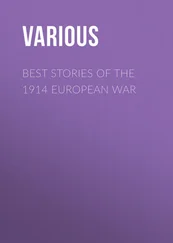Various - New York Times Current History - The European War, Vol 1, No. 1
Здесь есть возможность читать онлайн «Various - New York Times Current History - The European War, Vol 1, No. 1» — ознакомительный отрывок электронной книги совершенно бесплатно, а после прочтения отрывка купить полную версию. В некоторых случаях можно слушать аудио, скачать через торрент в формате fb2 и присутствует краткое содержание. Жанр: foreign_edu, periodic, История, на английском языке. Описание произведения, (предисловие) а так же отзывы посетителей доступны на портале библиотеки ЛибКат.
- Название:New York Times Current History: The European War, Vol 1, No. 1
- Автор:
- Жанр:
- Год:неизвестен
- ISBN:нет данных
- Рейтинг книги:4 / 5. Голосов: 1
-
Избранное:Добавить в избранное
- Отзывы:
-
Ваша оценка:
- 80
- 1
- 2
- 3
- 4
- 5
New York Times Current History: The European War, Vol 1, No. 1: краткое содержание, описание и аннотация
Предлагаем к чтению аннотацию, описание, краткое содержание или предисловие (зависит от того, что написал сам автор книги «New York Times Current History: The European War, Vol 1, No. 1»). Если вы не нашли необходимую информацию о книге — напишите в комментариях, мы постараемся отыскать её.
New York Times Current History: The European War, Vol 1, No. 1 — читать онлайн ознакомительный отрывок
Ниже представлен текст книги, разбитый по страницам. Система сохранения места последней прочитанной страницы, позволяет с удобством читать онлайн бесплатно книгу «New York Times Current History: The European War, Vol 1, No. 1», без необходимости каждый раз заново искать на чём Вы остановились. Поставьте закладку, и сможете в любой момент перейти на страницу, на которой закончили чтение.
Интервал:
Закладка:
The Russian Russians and Their Prussian Tsars.
And here I must save my face with my personal friends who are either Russians or discoverers of the soul of the Russian people. I hereby declare to Sasha Kropotkin and Cunninghame Graham that my heart is with their Russia, the Russia of Tolstoy and Turgenieff and Dostoieffsky, of Gorki and Tchekoff, of the Moscow Art Theatre and the Drury Lane Ballet, of Peter Kropotkin and all the great humanitarians, great artists, and charming people whom their very North German Tsars exile and imprison and flog and generally do what in them lies to suppress and abolish. For the sake of Russian Russia, I am prepared to strain every point in Prussian Russia's favour. I grant that the Nihilists, much as we loved them, were futile romantic people who could have done nothing if Alexander II. had abdicated and offered them the task of governing Russia instead of persecuting them and being finally blown to bits by them. I grant that the manners of the Fins to the Russians are described as insufferable both by the Swedes and the Russians, and that we never listened to the Russian side of that story. I am ready to grant Gilbert Murray's plea that the recent rate of democratic advance has been greater in Russia than anywhere else in Europe, though it does remind me a little of the bygone days when the Socialists, scoring 20 votes at one general election and forty at the next, were able to demonstrate that their gain of 100 per cent. was immensely in excess of the wretched two or three per cent. that was the best the Unionists or Liberals could shew. I am willing to forget how short a time it is since Sir Henry Campbell-Bannerman said: "The Duma is dead: long live the Duma!" and since we refused to allow the Tsar to land in England when his ship was within gangway's length of our shore, on which occasion I myself held up the Anglo-Russian agreement for the partition of Persia to the execration of a crowd in Trafalgar Square, whilst our Metropolitan Police snatched the l'sarbeleidigend English newspapers from the sellers and tore them up precisely in the Cossack manner. I have an enormous relish for the art of Russia; I perceive a spirit in Russia which is the natural antidote to Potsdamnation; and I like most of the Russians I know quite unaffectedly. I could find it in my heart to reproach the Kaiser for making war on the Russia of these delightful people, just as I like to think that at this very moment good Germans may be asking him how he can bring himself to discharge shrapnel at the England of Bernard Shaw and Cunninghame Graham. History may not forgive him for it; but the practical point at the moment is that he does it, and no doubt attributes the perfidy of England to the popularity of our works. And as we have to take the Kaiser as we find him, and not as the Hohenzollern legend glorifies him, I have to take the Tsar as I find him. When we fight the Kaiser we are not fighting Bach and Wagner and Strauss, to whom we have just joyfully surrendered without a blow at the battle of Queen's Hall, but all the forces in Germany that made things hard for Wagner and Strauss. And when we fight for the Tsar we are not fighting for Tolstoy and Gorki, but for the forces that Tolstoy thundered against all his life and that would have destroyed him had he not been himself a highly connected Junker as well as a revolutionary Christian. And if I doubt whether the Tsar would feel comfortable as a member of a Democratic League of Peace, I am not doubting the good intent of Kropotkin: I am facing the record of Kropotkin's imperial jailer, and standing on the proud fact that England is the only country in Europe, not excepting even France, in which Kropotkin has been allowed to live a free man, and had his birthday celebrated by public meetings all over the country, and his articles welcomed by the leading review. In point of fact, it is largely on Kropotkin's account that I regard the Tsar as a gentleman of slightly different views to President Wilson, and hate the infamous tyranny of which he is the figurehead as I hate the devil. And I know that practically all our disinterested and thoughtful supporters of the war feel deeply uneasy about the Russian alliance. At all events, I should be trifling grossly with the facts of the situation if I pretended that the most absolute autocracy in Europe, commanding an inexhaustible army in an invincible country with a dominion stretching from the Baltic to the Pacific, may not, if it achieves a military success against the most dreaded military Power in Europe, be stirred to ambitions far more formidable to western liberty and human welfare than those of which Germany is now finding out the vanity after worrying herself and everyone else with them for forty years. When all is said that can be said for Russia, the fact remains that a forcibly Russianized German province would be just such another open sore in Europe as Alsace-Lorraine, Poland, Macedonia or Ireland. It is useless to dream of guarantees: if Russia undertook to govern democratically she would not be able to redeem her promise: she would do better with primitive Communism. Her city populations may be as capable of Democracy as our own (it is, alas! not saying much); but the overwhelming mass of peasants to whom the Tsar is a personal God will for a long time to come make his bureaucracy irresistible. As against Russian civilization German and Austrian civilization is our civilization: there is no getting over that. A constitutional kingship of Poland and a sort of Caliphate of the Slavs in remapped southeastern Europe, with that access to warm sea water which is Russia's common human right, valid against all Balances of Power and Keys to India and the like, must be her reward for her share in the war, even if we have to nationalize Constantinople to secure it to her. But it cannot be too frankly said at the outset that any attempt to settle Europe on the basis of the present hemming in of a consolidated Germany and German Austria by a hostile combination of Russia and the extreme states against it, would go to pieces by its own inherent absurdity, just as it has already exploded most destructively by its own instability. Until Russia becomes a federation of several separate democratic States, and the Tsar is either promoted to the honourable position of hereditary President or else totally abolished, the eastern boundary of the League of Peace must be the eastern boundary of Swedish, German, and Italian civilization; and Poland must stand between it and the quite different and for the moment unassimilable, civilization of Russia, whose friendship we could not really keep on any other terms, as a closer alliance would embarrass her as much as it would embarrass us. Meanwhile, we must trust to the march of Democracy to de-Russianize Berlin and de-Prussianize Petrograd, and to put the nagaikas of the Cossacks and the riding-whips with which Junker officers slash German privates, and the forty tolerated homosexual brothels of Berlin, and all the other psychopathic symptoms of overfeeding and inculcated insolence and sham virility in their proper place, which I take to be the dustbin.
Driving Capital Out of the Country.
But I must here warn everyone concerned that the most formidable opposition to the break-up of these unnatural alliances between east and west, between Democracy and Autocracy, between the twentieth century and the Dark Ages, will not come from the Balancers of Power. They are not really Balance of Power alliances: in fact, they are tending to an enormous overbalance of power in favor of the east as against the west and in favor of Militarist Autocracy as against Democracy. They are at root absolutely unpatriotic, even absolutely conscienceless products of commercial finance; and the Balance of Power theories are only the attempts of our diplomats to put a public spirited face on the operations of private cupidity. This is not the first time nor the second that I have had to urge that the greatest danger to us in the sphere of foreign politics is the tendency of capital to run away from civilization: the one running downhill to hell as naturally as the other struggles uphill to the Celestial City. The Englishman is allowed to produce the subsistence of himself and his family only on condition that he produces the subsistence of the capitalist and his retainers as well; and lo! he finds more and more that these retainers are not Englishmen, but Russians, South Americans, Kaffirs, Persians, or yellow or black barbarians armed for his destruction (not to mention Prussians and Austrians), and that the treaties made by our diplomatists have less and less to do with the security of the nation or the balance of power or any other public business, and more and more with capitalist opportunities of making big dividends out of slavish labour. For instance, the Anglo-Russian agreement is not a national treaty: it is the memorandum of a commercial agreement settling what parts of Persia are to be exploited by the Russian and English capitalists respectively; the capitalists, always against State interference for the benefit of the people, being very strongly in favor of it for coercing strikers at home and keeping foreign rivals off their grass abroad. And the absurd part of it is that when the State has thus arranged for our capitalists to exploit certain parts of Persia, and for their sakes to protect the parliamentary liberties of the part left to Russia, they discovered that, after all, the most profitable game was to lend Russia the money to exploit with, and to facilitate the operation by allowing her to destroy the Persian parliament in the face of our own exhortation to it to keep the flag flying, which we accordingly did without a blush. The French capitalists had dragged France into an alliance with Russia long before this; but the French Republic had the excuse of the German peril and the need for an anti-German ally. Her natural ally for that purpose was England; but as there was no market in England for her money, her plutocrats drove her into the alliance with Russia as well; and it is that alliance and not the alliance with England that has terrified Germany into flying at her throat and plunging Europe into a frightful war. The natural alliance with England twice averted war: in the Moroccan crises of Algeciras and Agadir, when Sir Edward Grey said boldly that we should defend France, and took the first steps towards a joint military and naval control of the French and English forces. Why he shrank from that firm position last July and thereby led Germany to count so fatally on our neutrality I do not pretend to know; it suffices for my argument that we were able to hold the balance between France and Germany, but failed to hold it between Germany and Russia, and that it was the placing of Russian loans in France and England that brought Russia into our western affairs. It would have paid us ten times over to have made Russia a present of all we and France have lent her (indemnifying, of course, the holders of the stock through an addition to the income tax) rather than pay the price of a European war. But what is the use of crying for spilt milk? I am merely explaining why, when French money went to Russia, the French papers discovered that the Russians were a most interesting people and their Government—properly understood—a surprisingly Liberal Government; and why, when English money went to Russia, the English press suddenly developed leanings towards the Greek Church, and deplored the unofficial execution of Stolypin as deeply as it had rejoiced in the like fate of Bobrikoff. The upshot of it all is that western civilization is at present busy committing suicide by machinery, and importing hordes of Asiatics and Africans to help in the throat cutting, not for the benefit of the silly capitalists, who are being ruined wholesale, but to break up the Austrian Empire for the benefit of Russia and the Slavs of eastern Europe, which may be a very desirable thing, but which could and should be done by the eastern Powers among themselves, without tearing Belgium and Germany and France and England to pieces in the process.
Читать дальшеИнтервал:
Закладка:
Похожие книги на «New York Times Current History: The European War, Vol 1, No. 1»
Представляем Вашему вниманию похожие книги на «New York Times Current History: The European War, Vol 1, No. 1» списком для выбора. Мы отобрали схожую по названию и смыслу литературу в надежде предоставить читателям больше вариантов отыскать новые, интересные, ещё непрочитанные произведения.
Обсуждение, отзывы о книге «New York Times Current History: The European War, Vol 1, No. 1» и просто собственные мнения читателей. Оставьте ваши комментарии, напишите, что Вы думаете о произведении, его смысле или главных героях. Укажите что конкретно понравилось, а что нет, и почему Вы так считаете.











